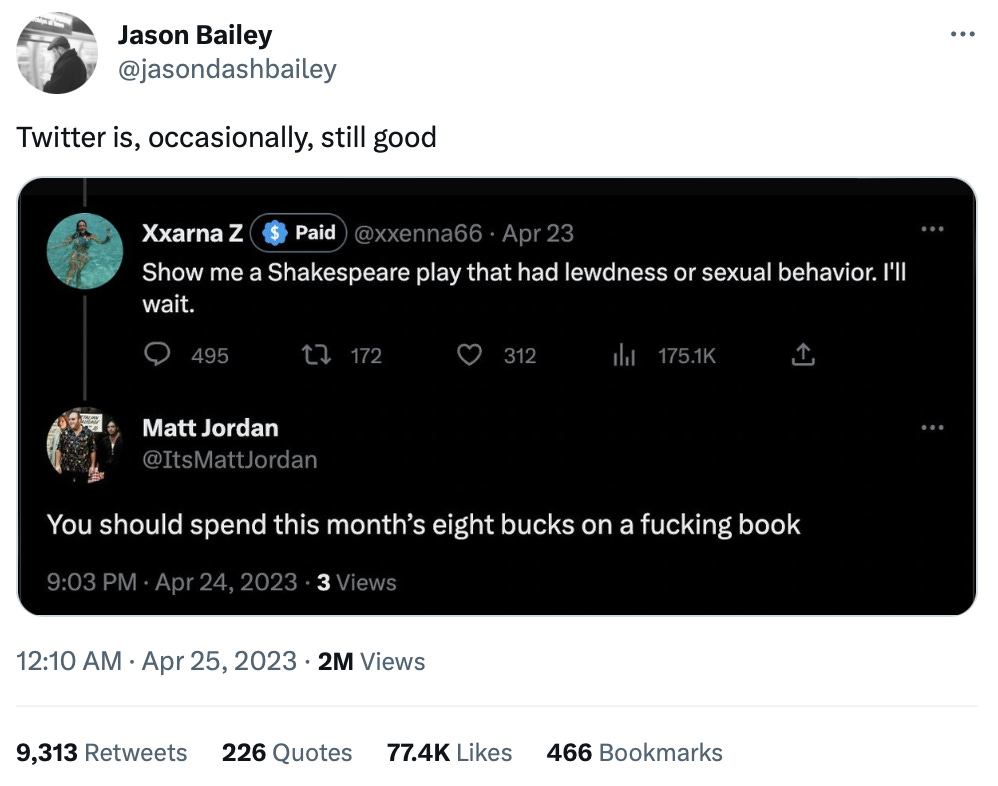The Discourse Report: May 4, 2023
Welcome to DiscRep, Berny Belvedere’s daily guide to the public discourse for Arc members. Got something you think I should include in a future entry? Write me at berny@arcdigital.media. To discuss any of today’s items, post a comment below.
Articles
How the Washington Establishment is Confounding Biden’s Debt Ceiling Plan by Jeff Stein in The Washington Post
Because of the messy House speakership fight that empowered the far right, and considering the rift between former president Donald Trump and the Washington establishment, Biden officials were optimistic that nonpartisan groups and the business lobby would see McCarthy’s demands as the White House did — as an outgrowth of the antidemocratic fervor that had swept through the GOP.
They also felt buoyed by precedent. When the debt ceiling needed to be raised in 2021, for instance, some Biden aides felt a turning point had been a White House meeting with titans of industry, in which JPMorgan Chase chief executive Jamie Dimon, Nasdaq president and chief executive Adena Friedman and Citi chief executive Jane Fraser warned of the catastrophic consequences of defaulting. Senate Minority Leader Mitch McConnell (R-Ky.) ultimately agreed to raise the debt limit with few meaningful concessions.
McCarthy, however, has been able to keep these voices largely at bay.
BuzzFeed, Gawker, and the Casualties of the Traffic Wars by Nathan Heller in The New Yorker
The decision to publish the Steele dossier originated with the reporter Ben Smith, then the editor-in-chief of BuzzFeed News and now the author of an illuminating book, “Traffic” (Penguin Press), about the rise of online traffic-chasing as a twenty-first-century media norm. In Smith’s telling, the laws of Web traffic, shaped by social media and their ability to disseminate material at exponential, “viral” rates, unseated old power structures. An old news outlet held its authority by retaining a fixed audience and standing on its record of success. A new one, such as BuzzFeed News, won largely by being linkable and first.
When it came to the Steele dossier, which a number of news organizations had in hand, Smith’s concern that someone else would beat him to the link made him feel physically unwell. His site wanted the traffic. And, when the CNN anchor Jake Tapper summarized the contents on air one day, Smith knew that viewers would be Googling for the goods. He and his colleagues, snatching the keyboard back and forth, composed a brief introduction that noted the dossier’s “specific, unverified, and potentially unverifiable allegations,” then posted the document itself, in PDF form. In his book, Smith recalls meditating on “the viral power of an object . . . something that readers would fixate on and pass hand to hand.”
That many of the dossier’s lurid claims were indeed unconfirmable and, after a litigation storm that boosted Trump’s position, got dismissed from serious discussion (if not from serious nightmares) only shows the high stakes of the transformation under way. Tapper, Smith notes, “was furious at me, but his decision to report on the existence of the Dossier made our choice both inevitable and easier to explain.” In the twenty-first century, the laws of traffic make demands, and we just follow.
The Counteroffensive by Anne Applebaum and Jeffrey Goldberg in The Atlantic
If a Ukraine that believes in the rule of law and human rights can achieve victory against a much larger, much more autocratic society, and if it can do so while preserving its own freedoms, then similarly open societies and movements around the world can hope for success too. After the Russian invasion, the Venezuelan opposition movement hung a Ukrainian flag on the front of its country’s embassy hall in Washington. The Taiwanese Parliament gave a rapturous welcome to Ukrainian activists last year. Not everyone in the world cares about this war, but for anyone trying to defeat a dictator, it has profound significance.
Who’s Afraid of the Big Bad Trump? by Varad Mehta in The Washington Examiner
The barrage of negative headlines has been so unrelenting that figures in the Republican Party have started wondering what many of the politerati already were: Perhaps DeSantis would be better off waiting until 2028 to pursue the Republican presidential nomination. That would be a grievous mistake. Not only must DeSantis run this year, but the GOP’s powers that be must also insist he do so — and for the same reason he’s being encouraged not to: the challenge, though a necessary one, of confronting Trump head-on.
Right now, cowardice and short-term calculation define the GOP’s response to the choice before it. A spate of Republican members of Congress already endorsed Trump, including half of those from Florida. Their rationales range from politics as usual to the petty. Many of the Florida representatives were endorsed by Trump, who has now called in that chit. Trump gathered them at Mar-a-Lago to thank them for their loyalty and as a display of dominance against his Sunshine State foe. Their reward: a Trump statement released the next morning lambasting DeSantis for creating “misery and despair” in Florida and trashing their home state as one of the “worst” on a host of quality-of-life measures.
Notes
Tweets
Clips
How To Stop AI Going Rogue (The Economist)





